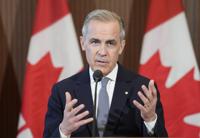BARCELONA, Spain (AP) — Spanish Prime Minister Pedro Sánchez has kept his part of a bargain struck last year with Catalonia’s separatists to keep him in power by pushing through a divisive amnesty bill. The legislation aims to clear hundreds of secession supporters for their roles in an illegal breakaway bid attempted six years ago.
The amnesty became a political necessity for the Socialist leader after an inconclusive national election last July left two Catalan separatist parties playing kingmaker. Their price for backing a new minority government led by Sánchez was nothing less than an amnesty for their supporters and leaders still in legal trouble, among other concessions.
The passing of the amnesty bill by Spain’s Parliament in the capital of Madrid by a vote of 178-172 on Thursday was supposed to provide a boost to Sánchez’s government, which hoped the separatists would afterward be more inclined to support a new national budget.
But those plans were dashed less than 24 hours earlier when Catalonia’s regional leader called a after failing to pass a regional budget by one vote. That created a domino effect whereby Sánchez’s treasury ministry said that she was scrapping any attempt to pass a budget for this year and would work on having it ready for 2025.
The prospect of having to negotiate a budget with the two highly demanding separatist parties while they were in campaign mode was too daunting for the central government. Sánchez’s government can carry the current national budget over into next year.
Oriol Bartomeus, a professor of political science at the Autonomous University of Barcelona, said Sánchez’s despite having cleared the amnesty hurdle, and the early election in Catalonia only buys it some time.
“The good thing for Sánchez is that instead of now having to face some extremely difficult negotiations over a budget, he can get a breather if the Socialists do well in the Catalan elections,” he told The Associated Press.
Spain faces an election-packed spring with a regional election in the Basque Country in April and European elections in June.
Members of Sánchez’s government professed confidence that it could muddle along. “We have three-and-a-half years of the term remaining,” Justice Minister Félix Bolaños said.
THE AMNESTY
Spain granted a sweeping amnesty during its transition back to democracy following the death of dictator Francisco Franco in 1975. But legal experts are divided over the constitutionality of the amnesty for the Catalan separatists. Its critics say that it violates the principle of equality among Spaniards by favoring those of one region.
The government says the amnesty could help hundreds of people, while the pro-independence Catalan organization Omnium Cultural says it should benefit some 4,400 people, mostly minor officials and ordinary citizens who either helped to organize the referendum or participated in .
Sánchez, who pardoned nine jailed separatist leaders in 2021, promoted the amnesty as a way to definitively move past the chaotic 2017 independence referendum attempt by the then-leaders of Catalonia, a northeastern region centered around Barcelona where many speak the local Catalan language as well as Spanish.
However, the bill has also met opposition from Spaniards who believe that the people who provoked one of the European nation’s biggest political crises should face charges including embezzlement and promoting public disorder. The conservative opposition accuses Sánchez of selling out the rule of law in exchange for another term in the Moncloa Palace and has organized major street protests during recent months.
Socialist party parliamentary spokesman Patxi López defended the bill Thursday as a move to seek a page-turning “reconciliation” with Catalonia.
The opposition Popular Party leader Alberto Núñez Feijóo hit back saying that “this is not reconciliation but submission.”
The bill still faces a number of procedural steps before becoming law. The Senate, which has a conservative majority, is expected to reject it, which would mean that Parliament’s lower house will have to vote for it a second time to push it through.
The application of the amnesty will be decided by the courts on a case-by-case basis.
PUIGDEMONT
The secession crisis erupted in 2017, when a regional administration led by Carles Puigdemont staged an illegal referendum on independence, defying orders from the national government and a ruling from Spain’s top court that doing so violated the constitution. Madrid sent in police in an attempt to stop the referendum, which was opposed by protests that turned violent.
Despite half the Catalan population voting for unionist parties, the Catalan Parliament declared independence on Oct. 27 that year but it failed to garner any international support. Puigdemont and several other senior officials soon fled Spain.
Sánchez’s party had a very hard time crafting a bill that satisfied the separatists and which will surely be highly scrutinized by the courts. Parliament in late January when Junts, a separatist party led by Puigdemont, said it didn’t do enough to protect Puigdemont. The bill then went back to a parliamentary committee, where it was tweaked to suit Junts’ demands.
Recent court probes have accused the former regional president of terrorism for allegedly masterminding massive protests that clashed violently with police and closed roads, train lines and the Barcelona airport in 2019.
Puigdemont now lives in Belgium, where he has become a European Parliament member. A fugitive from Spanish justice, he calls himself a political exile.
Puigdemont said Thursday that he will “probably” decide next week whether he will run as Junts’ candidate in the Catalan elections while abroad. If he is cleared by the amnesty, then in theory he would be free to return to Spain later this year.
___
Associated Press writer Ciarán Giles in Madrid contributed to this report.












































